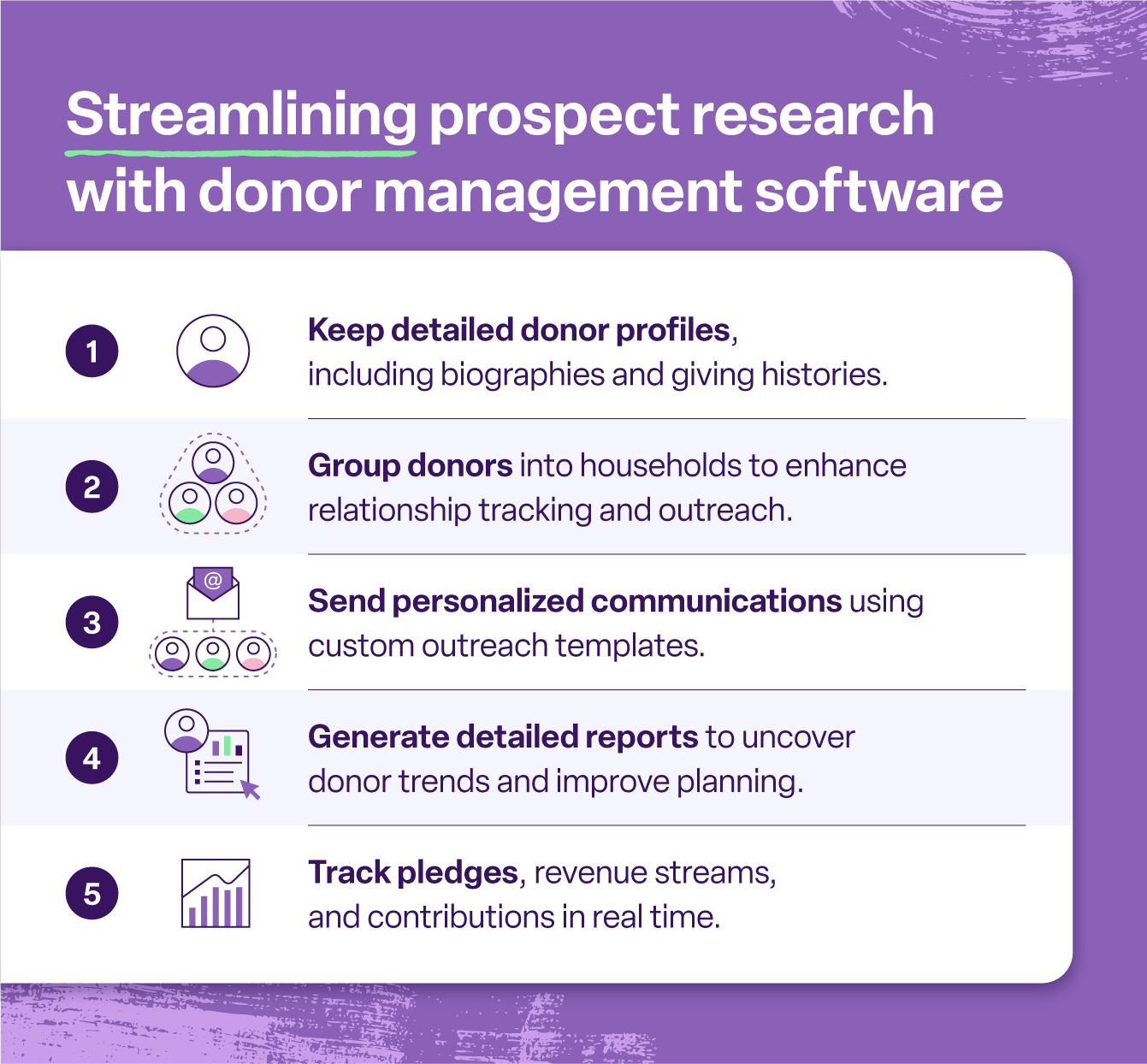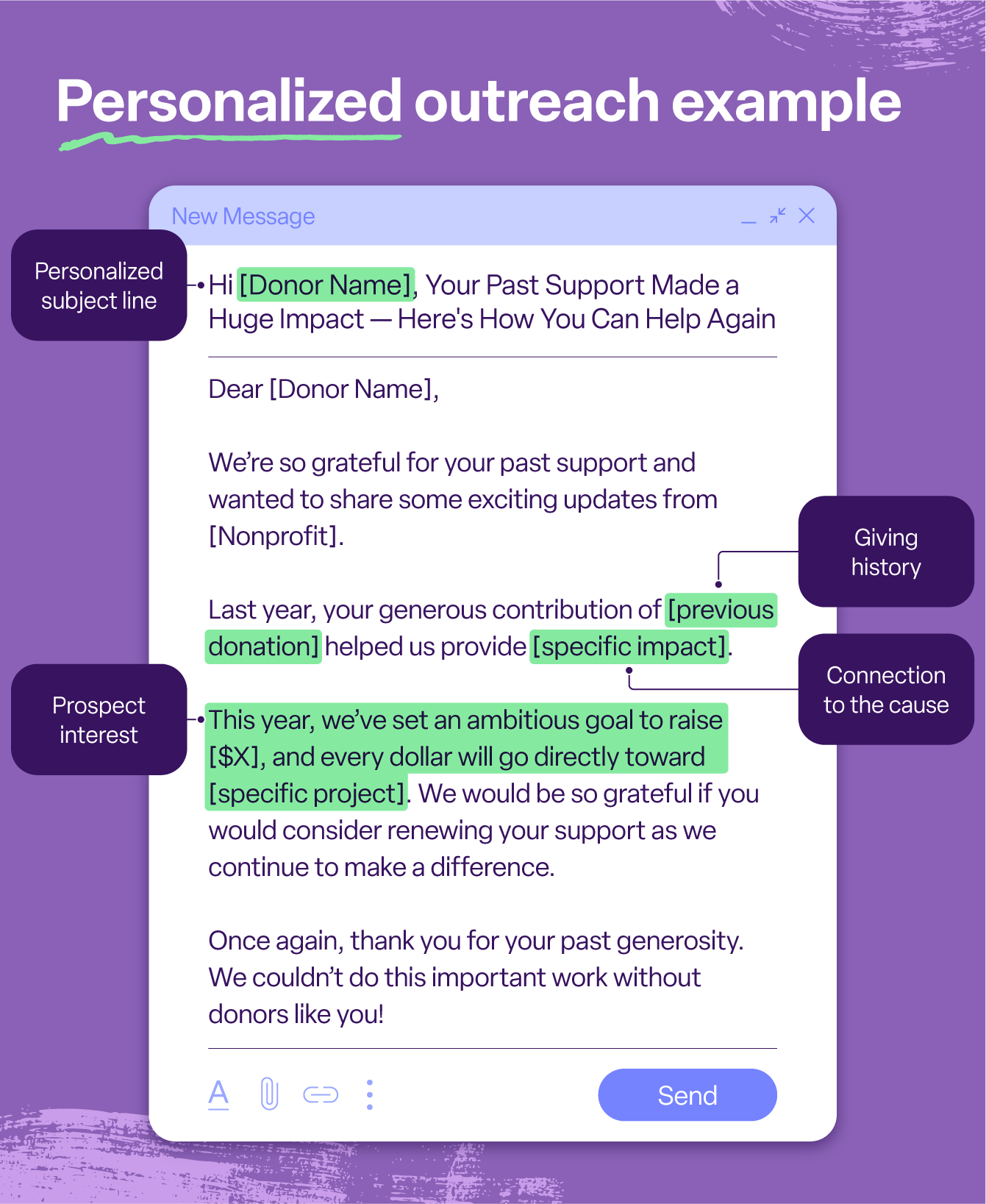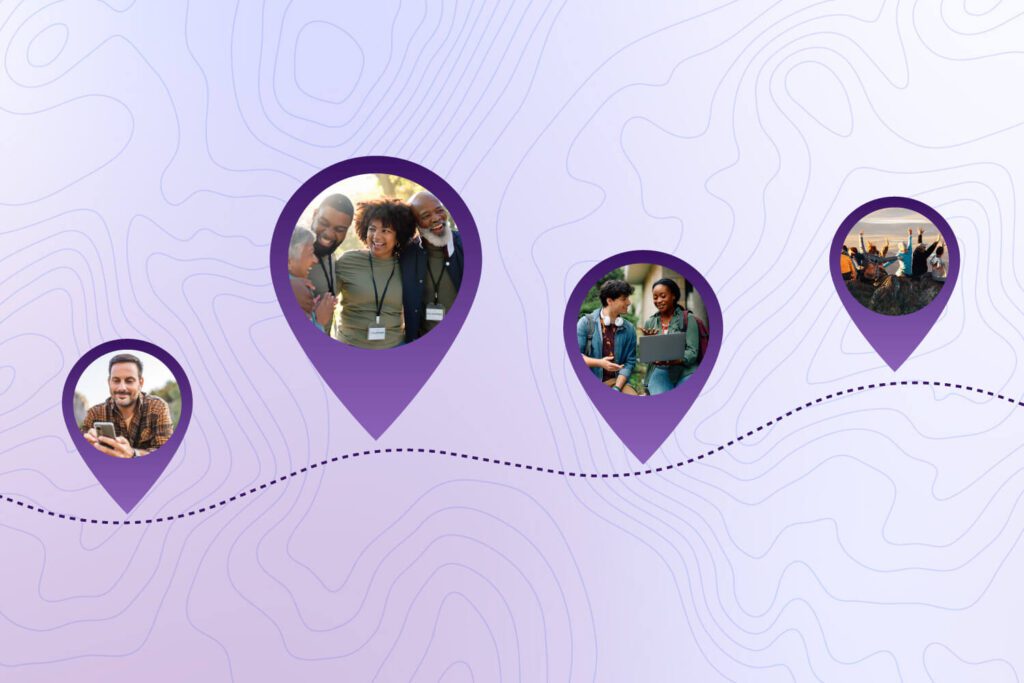Prospect research: A nonprofit’s guide to uncovering hidden fundraising potential

In nonprofit fundraising, prospect research is the key to identifying and engaging potential donors. By better understanding individuals’ backgrounds and philanthropic goals, nonprofit organizations can uncover hidden fundraising ideas and grow donor relationships.
But how exactly do you figure out who your prospects are, what they care about, and their capacity to give?
Whether you’re fundraising for a local organization or a large academic institution, prospect research will provide key insights to inform your efforts. Let’s get started.
What is prospect research?
Prospect research is a tactic used to understand donor prospects, giving you a clear understanding of their ability and affinity to give to an organization. Through prospect research, organizations can identify potential high-value donors within their existing community and generate new prospects.
There are three main prospect research indicators, including:
- Capacity: These markers reveal a prospect’s financial ability to donate. Wealth indicators, such as real estate ownership, stock holdings, business affiliations, and political contributions, provide insights into their financial capacity. For example, individuals with high-value real estate are statistically more likely to engage in significant philanthropic giving.
- Affinity: These indicators tell you about someone’s willingness or likelihood to give, which can’t be determined through wealth alone. It encompasses their personal values, interests, and connection to your organization.
- Philanthropic history: This indicator reveals a prospect’s historic commitment to charitable giving. It includes past donations, volunteer work, board service at nonprofits, and alignment with your organization’s cause.

Fundraising professionals can leverage this data for more successful campaigns and increased revenue to power your organization’s purpose.
Why is prospect research important?
Prospect research is important for maximizing your fundraising potential and provides the crucial foundation for strategic decision-making.
By understanding a prospect’s capacity, affinity, and philanthropic history, organizations can tailor their outreach and cultivate meaningful relationships. This targeted approach not only increases the likelihood of securing major gifts but also ensures that valuable resources are allocated efficiently, ultimately amplifying the impact of every fundraising initiative.
Strategic prospect research also allows nonprofits to identify hidden gems within their existing donor base and uncover new prospects who align with their mission.
What’s the difference between prospect research and wealth screening?
While both prospect research and wealth screening aim to uncover donor potential, they differ in scope.
Wealth screening primarily focuses on identifying a prospect’s financial capacity to give. Prospect research is a broader approach, incorporating wealth data along with philanthropic indicators, relationship mapping, and in-depth analysis to build a prospect profile. Essentially, wealth screening is just one component of a full prospect research strategy.
Who conducts prospect research?
Prospect research is crucial for organizations looking to maximize their fundraising effectiveness. The actual work of prospect research may be carried out by dedicated staff members, such as prospect researchers or development officers, or it may be incorporated into the responsibilities of other fundraising professionals.
The specific roles involved can vary depending on the size and structure of the organization but often include development directors, advancement officers, and database managers. Organizations that frequently conduct prospect research include:
- 501(c)(3) nonprofits of all sizes and missions
- Educational institutions
- Healthcare organizations like hospitals
- Greek organizations
- Arts, culture, and humanities organizations
- Faith-based groups, including churches, synagogues, and mosques
- Advocacy groups
- Environmental awareness groups
Different approaches to prospect research
Gathering and processing a huge number of records to glean the most useful information can require a lot of time and effort, but there are also ways to experiment with prospect research on a smaller scale. The prospecting method you select will depend on the size of your organization and the fundraising tools you have available.
- DIY: For organizations with limited resources, existing development team members can manage prospect screening. There are many training resources available online to help guide this process. If you’re working with limited staff and funding, this may be the best option.
- In-house research staff: If your organization has the resources to hire additional full-time team members, you can bring in experienced researchers to screen and analyze prospect data. This option is best for mid- to large-size organizations.
- Consultants: Consider bringing in a consultant who specializes in prospect research, and make sure to be strategic about what goals you’re trying to accomplish. You’ll want to select a consultant with proven experience in organizations similar to yours.
- Screening services: A prospect screening service is the best way to sift through large amounts of data for easy analysis. These services can help you find major gift prospects, and many integrate with existing software, ensuring seamless data accessibility.
How to do prospect research successfully
Effective fundraising research isn’t just about collecting data — it’s also about transforming that data into actionable insights to drive fundraising results.
Here are the seven key steps to conduct prospect research.
Step 1. Choose your research strategy
Begin by determining the scope and objectives of your research.
Will you focus on major gifts, annual giving, or a specific campaign?
You might opt for a proactive strategy, where you actively seek out new prospects based on specific criteria, such as wealth indicators, philanthropic history, or professional affiliations. Conversely, a reactive strategy involves researching individuals who have already shown interest in your organization, such as event attendees or online donors.
A hybrid approach combines both, leveraging existing data while simultaneously exploring new avenues for potential support. Consider your organization’s resources, goals, and the types of donors you’re targeting to determine the most effective strategy.
Step 2. Clean up your data
Before diving into extensive research, ensure your existing donor database software is accurate and up-to-date. This clean data will serve as a solid foundation for your prospect research efforts.
Start by identifying and correcting duplicate entries, outdated contact information, and inconsistencies in data fields. Utilize data append services to fill in missing information and verify existing records. Regularly audit your database to maintain data integrity and improve the efficiency of your research efforts.
Step 3. Conduct screenings
Screening involves utilizing various tools and databases to gather comprehensive information about potential donors. This includes analyzing wealth indicators, philanthropic history, and business affiliations.
Screening tools can help automate this process, providing valuable insights into a prospect’s capacity and inclination to give. Consider factors such as the cost of screening services, the depth of information provided, and your organization’s specific needs when selecting screening tools.

Step 4. Analyze results
Once you’ve gathered screening results, it’s time to analyze the data and identify key trends and patterns. Focus on identifying prospects with the highest giving capacity and strongest affinity for your mission.
Prioritize prospects based on factors such as wealth indicators, philanthropic history, and alignment with your organization’s values. Use the analysis to create prospect profiles and segment your audience, such as by giving history, for targeted outreach.
Step 5. Develop a solicitation plan
Based on your analysis, develop a tailored solicitation plan for each prospect segment. This plan should outline the specific outreach strategies, messaging, and engagement opportunities that will most likely resonate with each group.
Consider the prospect’s communication preferences, giving history, and relationship with your organization when developing your plan. Tailor your approach to maximize engagement and increase the likelihood of securing a gift.
Step 6. Solicit donors
The solicitation process involves reaching out to potential donors and directly requesting support. This can be done through various channels, such as personalized sponsorship letters, phone calls, in-person meetings, or online campaigns.
Personalization is key to successful solicitation. Highlight the impact of the prospect’s potential gift and emphasize how their support will contribute to your organization’s mission. Be prepared to answer questions and address any concerns they may have.
Step 7. Measure performance
After soliciting donors, it’s essential to track key metrics to evaluate the effectiveness of your prospect research and solicitation efforts. Monitor response rates, gift amounts, and return on investment (ROI).
Analyze the data to identify areas for improvement and refine your strategies for future campaigns. Regularly review your performance metrics to ensure your prospect research efforts align with your fundraising goals and contribute to your organization’s long-term sustainability.
The benefits of prospect research fundraising
The most effective fundraising is driven by a strong base of donor data. Prospect research enables you to make smarter decisions about your campaigns so you can make the most of the funds you allocate to fundraising.
Increases prospect opportunities
Prospect research for fundraising expands opportunities beyond your existing donor pool. By delving into demographic, philanthropic, and financial data, you can identify individuals and organizations with a demonstrated capacity and inclination to support your cause.
This proactive approach helps you target niche demographics that align with your mission, ensuring your fundraising efforts are focused on the most promising avenues.
Allows for better personalization
Generic appeals often fall flat, while tailored messages resonate deeply. Prospect research provides the insights necessary to craft personalized outreach.
Once you understand a prospect’s interests, giving history, and connection to your cause, you can create compelling narratives that speak directly to their values. This level of personalization fosters stronger relationships, increases engagement, and ultimately leads to higher conversion rates.

Enriches existing data
Your existing donor database is a valuable asset, but there’s always room for improvement. Prospect research acts as a powerful data enrichment tool, filling in missing information, verifying existing records, and adding new layers of insight.
This comprehensive view of your donors allows you to segment your audience more effectively, identify trends, and gain a deeper understanding of their motivations. A well-enriched database is crucial for a healthy fundraising strategy.
Maximizes revenue
Effective fundraising is about working smarter, not harder. Prospect research enables you to focus your efforts on high-potential donors — individuals and organizations with the capacity and inclination to make significant contributions.
By prioritizing these prospects, you can maximize your return on investment and secure the funding necessary to achieve your mission — leading to more substantial and sustainable revenue streams.
Improves fundraising resources
Fundraising resources — time, budget, personnel — are finite. Prospect research helps you allocate these resources more effectively. By identifying the most promising prospects and tailoring your outreach accordingly, you can streamline your fundraising efforts and optimize resource utilization.
This targeted approach minimizes wasted effort and ensures your resources focus on the activities that yield the highest return. It also helps in knowing where to devote time to cultivation and which donors are best suited for what type of outreach.
Prospect research best practices
Effective prospect research is a continuous process that requires a strategic approach and attention to detail. Here are some tips for developing stronger donor relationships and increased fundraising success.
- Define clear research objectives: Before you begin, clearly define what you hope to achieve with your prospect research. Having well-defined objectives will guide your research and ensure you focus on the most relevant information.
- Prioritize data accuracy: Accurate data is the foundation of successful prospect research. Regularly verify and update your information to ensure it’s current and reliable. Inaccurate data can lead to wasted time and resources and damage your organization’s reputation.
- Utilize donor management software: Donor management software can streamline your prospect research process by centralizing data, automating tasks, and providing valuable insights. It allows you to track prospect interactions, manage relationships, and analyze giving patterns.
- Integrate multiple data sources: Don’t rely on a single source of information. Combine data from various sources, such as public records, online databases, and social media, to create a comprehensive picture of your prospects. This multi-faceted approach provides a more accurate and complete understanding of each individual.
- Focus on quality over quantity: Having a smaller pool of well-qualified prospects is more effective than a large list of unqualified leads. Prioritize prospects based on their giving capacity, philanthropic history, and alignment with your mission.
- Segment your prospects: Group your prospects based on shared characteristics, such as giving capacity, interests, or relationship with your organization. This allows you to tailor your outreach and messaging to each segment, increasing the likelihood of engagement.
- Personalize your outreach: Personalization is key to building strong donor relationships. Use the information you’ve gathered through prospect research to create personalized messages and engagement opportunities that resonate with each individual.
- Utilize prospect research resources: Take advantage of available prospect research resources, such as online databases, professional networks, and industry publications. These resources can provide valuable insights and help you identify new prospects.
Streamline prospect research with donor management software
Donor management software isn’t just for managing existing donors. It’s a powerful tool for streamlining your prospect research and online fundraising efforts. Regardless of the prospecting method you choose, the wealth and philanthropic information you discover will help you make data-driven decisions to put your organization on the most efficient track to success.
By centralizing data, automating tasks, and providing valuable insights, donor management software can significantly enhance your ability to identify and cultivate potential donors.
FAQ
In fundraising, “prospects” refers to individuals, organizations, or foundations that have the potential to become donors or supporters of a nonprofit organization.
Work with Bonterra



